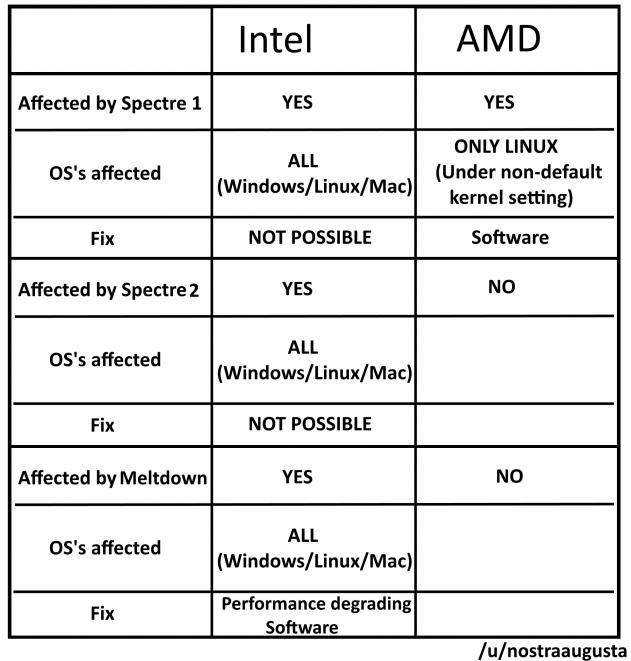Master_shake_
Fully [H]
- Joined
- Apr 9, 2012
- Messages
- 17,794
welp my 4790k just turned in to a 870k.
thanks intel.
thanks intel.
Follow along with the video below to see how to install our site as a web app on your home screen.
Note: This feature may not be available in some browsers.
Something is up and smells like a cover up , or market manipulation or overall a big mess upIntel Officially Announces...Kicking The Can Down The Road, and admitting no flaws.
https://newsroom.intel.com/news/intel-responds-to-security-research-findings/
Intel Officially Announces...Kicking The Can Down The Road, and admitting no flaws.
https://newsroom.intel.com/news/intel-responds-to-security-research-findings/

nope its everyone not just us deflect deflect lie to save their ass
Translation: Everyone is talking a load of bollocks, there is no problem and we (intel)are perfect.Intel Officially Announces...Kicking The Can Down The Road, and admitting no flaws.
https://newsroom.intel.com/news/intel-responds-to-security-research-findings/

Anyone can sign up for Windows Insider program and get the changes now if they are interested. Who is going first?
Is there a way to block the update?
I want to keep every last bit of my performance.
10% performance hit will greatly fuck up emulator performance and Assassin's Creed Origins. THERE'S how it affects your average user here. Wii U games are going to go from being playable to slideshows.

It shouldn't affect gaming performance at all, you should be fine.
Well, if the rumors are to be believed, Microsoft's patch just does the same thing for all processors, so expect a lawsuit from AMD for slowing down their processors to make Big Daddy Intel happy.
Except Assassin's Creed Origins is a double-DRM'd pile of shit that causes quad-core Intel CPUs to reach 100% usage.
And clearly you don't understand how emulation works. CPU performance is more critical than GPU performance for emulating console games. That extra 10-20% of extra performance you get out of having the latest Intel quad core CPU is the difference between playing The Legend of Zelda: The Breath of the Wild at a smooth and stable 60 FPS instead of a janky slowed down framerate. Cemu needs every ounce of CPU power possible.

Hmm thought Linus made an exception for AMD since it is an non issue for them.maybe not, looks like amd needs no software fix for hte type of protection needed that will affect performance, Linux jsut imposed a blanket protect being a small fry OS, MS have the ability to code exceptions
Hmm thought Linus made an exception for AMD since it is an non issue for them.
The performance loss in the patch is mostly felt in IO heavy applications. For mostly CPU heavy applications, the performance loss is very small. For AC:O, Computerbase saw a 3% loss at 1080 lowest preset with a 1080 Ti.

https://www.computerbase.de/2018-01/intel-cpu-pti-sicherheitsluecke/
More than likely, CEMU will still be much faster on modern Intel processors than AMD ones.
I'm not sure what your point is, this is with the Windows variant of the patch to fix the Intel vulnerability installed.I guess the silver lining in all this is while you game (may your frame rates be as high as your temps), someone is potentially stealing personal information from you to use for whatever they want when they want. But lets make this about gaming.
I'm not sure what your point is, this is with the Windows variant of the patch to fix the Intel vulnerability installed.
Did you even look at the screenshot you are talking about?Windows 10 hasn't had a kernal patching yet, 1709 is basically just an anniversary edition update. And gaming is not affected, though things that actually make intel money are gravely affected.
The performance loss in the patch is mostly felt in IO heavy applications. For mostly CPU heavy applications, the performance loss is very small. For AC:O, Computerbase saw a 3% loss at 1080 lowest preset with a 1080 Ti.

https://www.computerbase.de/2018-01/intel-cpu-pti-sicherheitsluecke/
More than likely, CEMU will still be much faster on modern Intel processors than AMD ones.
He's been hit or miss a few times but I still consider him reliable.wait wait you cant post that video. He is very PRO-AMD Shintai and Juanga said so!
Assuming consumers don't use system calls then ya, ~0%As expected the impact for consumers is ~0%.
wait wait you cant post that video. He is very PRO-AMD Shintai and Juanga said so!
The performance loss in the patch is mostly felt in IO heavy applications. For mostly CPU heavy applications, the performance loss is very small. For AC:O, Computerbase saw a 3% loss at 1080 lowest preset with a 1080 Ti.
https://www.computerbase.de/2018-01/intel-cpu-pti-sicherheitsluecke/
I don't get why we have to have gaming benches for a security related threat, this needs to be demonstrated on database/SQL type benches.
In fairness, I don't get why a security patch has a 3-5% hit on gaming in CPU limited situations.